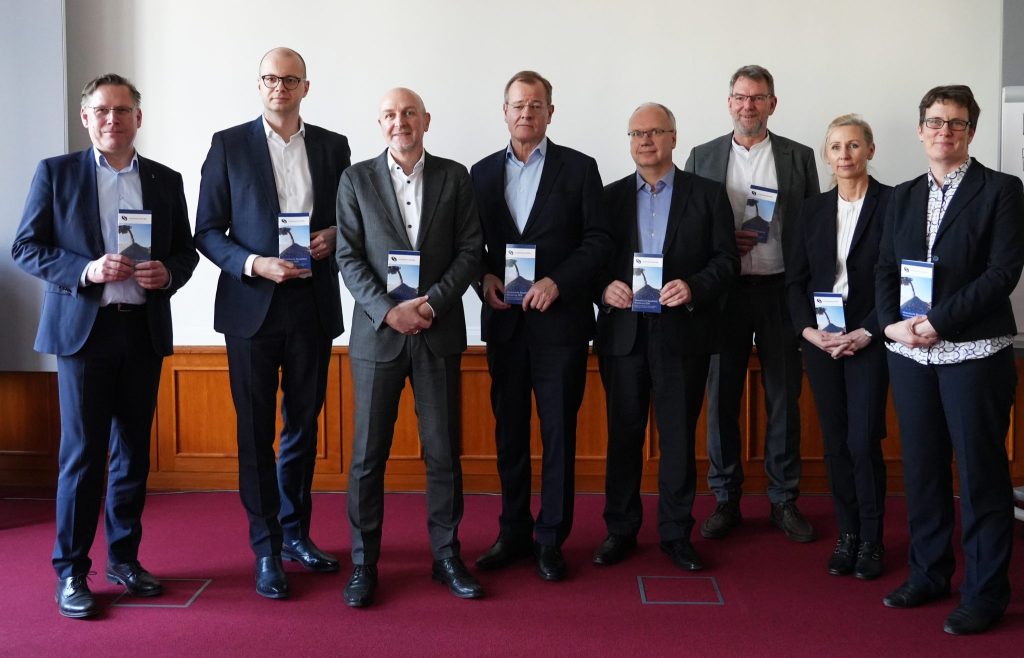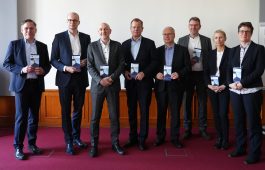
Federal Building Ministry receives current report of the “Initiative Kreislaufwirtschaft Bau”: 90 percent of all mineral construction waste is recycled in an environmentally friendly manner.

Berlin, 15.2.2023: “The environmental impact of buildings in operation is present to everyone who has only a few at the beginning and at the end of a building’s life. Thanks to the commitment of the Circular Economy Construction Initiative, Germany is well above the European target (70 percent) at around 90 percent.
What is already good can still be improved. We will advocate for more research in this area and promote the acceptance of substitute building materials. Thus, we can achieve two goals in the foreseeable future: reduce waste during construction – keyword circular economy – and make substitute building materials a coveted climate protection product,” says Dr. Rolf Bösinger, State Secretary at the Federal Ministry of Housing, Urban Development and Construction.
Since 1996, the Initiative Kreislaufwirtschaft Bau has been publishing monitoring reports every two years with data on the generation and fate of mineral construction waste. The current report is based on official data from 2020.
“Today, mineral construction waste is almost completely recycled, which relieves landfills and conserves primary raw materials. More than 13 percent of the demand for aggregates is now covered by recycled building materials,” explained Dr. Matthias Frederichs, Managing Director of the Federal Association of Building Materials – Stones and Earths.
“Of the total of 220 million tonnes of mineral construction waste generated in 2020, more than 197 million tonnes, i.e. around 90 percent, were recycled in an environmentally friendly manner.”
Road construction achieve highest recycling rates
“In road construction, we achieve the highest recycling rates of almost 96 percent. Through local processing and reuse by means of innovative extraction and recycling processes, we are implementing the circular economy idea almost optimally here,” explained Tim-Oliver Müller, Managing Director of the Main Association of the German Construction Industry.
“This is also technically possible in other areas if the political framework conditions are consistently aligned with the goal of the circular economy.”
“Selective dismantling and strict separation contribute to the fact that more than 94% of construction rubble can now be put to new uses. In order to leverage remaining potential, the political goals must be implemented in the administrations and sales markets established, for which the product status of quality-monitored and repeatedly tested substitute building materials is indispensable,” stated Andreas Pocha, Managing Director of the German Demolition Association.
This assessment is shared by Christine Buddenbohm, Managing Director of the Federal Association for Recycled Building Materials. “The quality-assured substitute building materials produced by our companies are subject to self-monitoring and external monitoring and meet high quality standards. However, we continue to see that acceptance among both private and public builders can be increased.”
Public sector should have a pioneering role
In order to increase acceptance, Peter Kurth, Managing President of the Federal Association of German Waste, Water and Recycling Management, and Sandra Giern, Managing Director of the Federal Association of Recycled Building Materials, see the public sector as having a duty to take on a proactive pioneering role.
“In the case of existing construction projects, the public sector must commit itself to ensuring that no demolition is carried out without prior pollutant exploration, selective dismantling and the best possible processing of the material in order to recycle substitute building materials as accurately as possible,” demanded Peter Kurth.
Sandra Giern also expects the public sector to make greater commitment to sustainable procurement. “The currently prescribed limited preferential obligation is not practicable and must be replaced by a mandatory use of substitute building materials in public construction projects. Only if there is a conclusive justification why such an application is not feasible may the use of substitute building materials be dispensed with in the future.”
Felix Pakleppa, Managing Director of the Central Association of the German Construction Industry, sees the legal regulation on the end of waste status promised by the Federal Environment Ministry as a further decisive lever.
“A waste end ordinance will promote the use of mineral substitute building materials much more. Such a regulation would achieve more for the circular economy than a discussion about product-specific recycling quotas”. The possibility of not letting the material become waste in the first place should also be examined.
The participants see it as a joint task to use more substitute building materials in the manufacture of new products in the future, if resources and climate can be conserved even better as a result.
The monitoring reports “Mineral construction waste” are available free of charge on the Internet under www.kreislaufwirtschaft-bau.de.

From left to right:
– René Hagemann, HDB
– Dr. Matthias Frederichs, bbs
– Rolf Bösinger, BMWSB
– Felix Pakleppa, ZDB
– Andreas Pocha, DA
– Dr. Berthold Schäfer, bbs
– Christine Buddenbohm ZDB, Bundesgütegemeinschaft Recycling-Baustoffe
– Sandra Giern BDE/BRB




